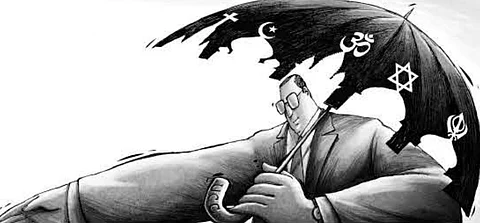

With the BJP coming to power in several states, many leaders of this party at the state level have begun campaigning for a Uniform Civil Code (UCC) in the country. The latest to join this chorus is Pushkar Singh Dhami, who has begun his second innings as Chief Minister of Uttarakhand recently.
At the first meeting of his Cabinet, Dhami decided to set up an expert committee to examine the issue and come up with a draft code. He had made this commitment during the campaign for the state Assembly elections held recently. With this, Uttarakhand has set the ball rolling for states to test the waters by stepping into this legislative field.
Article 44 of the Constitution makes a reference to a UCC and says, "The State shall endeavour to secure for the citizens a uniform civil code throughout the territory of India." This is in the chapter dealing with the Directive Principles of State Policy and is therefore presumed to be advisory in nature.
However, many of the matters pertaining to the Uniform Civil Code figure in item five of the Concurrent List in the Seventh Schedule of the Constitution that demarcates the legislative powers of the Union government and the states. Both the Central government and the states can legislate on matters in this list.
Under the Muslim Personal Law (Shariat) Application Act, 1937, issues such as marriage, maintenance, dower, divorce and inheritance come within its purview. Many of these also find a place in item five of the Concurrent List. Also if it were to push through such a law, Uttarakhand will not be the first state to do so. In fact, currently Goa is the only state in the country that has a UCC since the days of Portuguese rule.
But the idea of a UCC has constantly met with resistance from the Muslim community. The All India Muslim Personal Law Board declared last November that it was opposed to the idea of a UCC and said "it was neither suitable nor useful" for a vast, multi-religious country like India.
The views expressed by Islamic organisations vis-a-vis the UCC in recent years are more or less in line with those expressed by Muslim members of the Constituent Assembly when Article 44 came up for discussion on 23 November 1948. All of them objected to this Article, even though it was only advisory in nature. A look at those debates will show that while so much has happened over the last 75 years since India gained independence, the Muslim viewpoint on this matter remains unchanged.
The objectors in the Constituent Assembly included Muhammad Ismail Sahib, Naziruddin Ahmad, Mahboob Ali Baig Sahib Bahadur, Pocker Sahib Bahadur and Hussain Imam.
Ismail Sahib contended that there was no need to regiment the civil law of the people. Naziruddin Ahmad also introduced an amendment on similar lines and said that the laws pertaining to marriage and inheritance were part of religious injunctions.
Mahboob Ali Baig Sahib Bahadur claimed that for 1,350 years, personal law had been practised by Muslims and recognised by all authorities. The arguments of the Muslim members were countered by KM Munshi, Alladi Krishnaswami Ayyar and BR Ambedkar, who was the chairman of the Drafting Committee.
Munshi disagreed with the arguments advanced against the Article and said many countries had common civil codes.
He said the personal laws of minorities were not recognised in any of the advanced Muslim countries. Citing Turkey and Egypt, he said no minority in these countries was permitted to have its own personal law. Further, when the Shariat Law was passed by the Central legislature, the Muslim members rammed it through and said it would apply to all members of the community even though the Khojas and Cutchi Memons did not want to submit to it. "Where was the rights of minorities then?"
Alladi Krishnaswami Ayyar said the leaders of India wanted the whole of the country to be welded and united together into a single nation. Are we helping this process or "is this country to be kept always as a series of competing communities? This is the question before us".
Ambedkar said he was "very much surprised" by the arguments put forth by the Muslim members because there was already a uniform and complete criminal code, a Transfer of Property Act, the Negotiable Instruments Act and other laws that means practically there was a civil code applicable to the whole of the country.
Further, Ambedkar challenged the contention of Muslim members, who said that their law is immutable and uniform throughout India and that it is followed by all those who practise the faith from ancient times. Ambedkar said that up to 1935, the North-West Frontier Province and other states followed the Hindu law in the matter of succession. In fact, in north Malabar, the Marumakkathayam, which was a matriarchal system, applied to all, including the Muslims.
Ambedkar concluded his arguments and said it would be alright to incorporate certain portions of the Hindu law in order to evolve a common civil code. However, there were two Muslim members of the House - Naziruddin Ahmad and Hussain Imam - who felt that India could have a common civil code, "sometime later".
The question is whether 75 years is not a long time. As regards the rights of minorities, can one hope for ideas such as equality and fraternity to develop uniformly within the country, if one constantly keeps harping on differences as Alladi Krishnaswami Ayyar had warned?
(The writer is former chairman of Prasar Bharati and Scholar, Democracy Studies and can be reached at suryamedia@gmail.com)